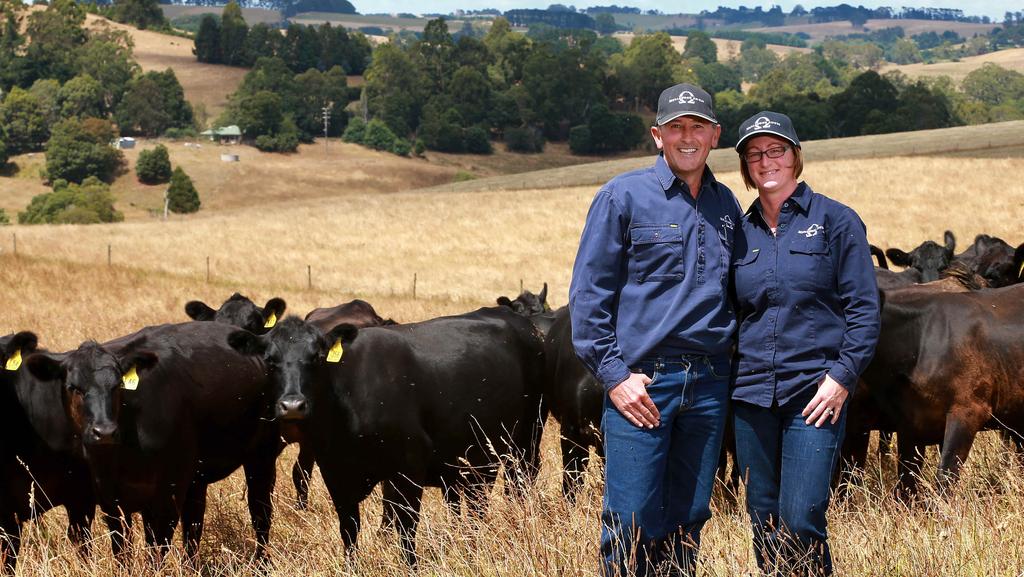WHILE sipping beer in a Bavarian beer garden in Munich, Anne Marie and Daniel Barrow hatched a plan for their future farm in Australia.
For 10 years as they sipped, they discussed, argued and came up with a vision of what they would farm and where.
Then they put the plan into action.
The Barrows will hold their first autumn bull sale for their stud Merlewood Angus on-property at Mirboo North on Friday March 24 at 11.30am.
The bulls will be available for inspection from 8am.
Anne Marie, who was originally from near Glasgow in Scotland, met Daniel, who was originally from between Roma and Dalby in Queensland, while working in Munich, Germany, in the construction industry.
They planned to buy a farm in Australia, and South Gippsland ticked all the boxes.
“It has a permanent water supply, is on the edge of town and is big enough to establish a stud on,” David said.
They run about 30 bulls, 220 breeding cows, 180 weaners and about 50 replacement females on 273ha at the edge of town.
Anne Marie said 10 years ago most of the cattle in South Gippsland were Hereford, but being from Scotland she was quite partial to Angus.
“Angus is mostly what we ate in Europe,” Anne Marie said.
“We did the research to make sure there was a market for it.
“You can see what Angus Australia does with the brand and it’s really taking off.”
Anne Marie said a farmer told them that “what you do in life has to make you smile”.
“When I look out and see a paddock of Angus, that makes me smile.”
The couple started the stud with 20 cows from a dispersal nearby, then began an embryo transfer program with genetics from Alpine Angus and The Grange, and also purchased females from Lawsons and Te Mania.
“In later years embryos were flushed from them,” Anne Marie said. “We’ve been flushing embryos from the leading cows for the past three years.
“We also send embryos to Calf Corp near Holbrook then they return the calves to us.”
Anne Marie said it was so dry in Mirboo North last year, there was little feed and they didn’t have enough donor cows.
“We get the calves back in time to enter the weaning program and it’s part of our five-year business plan to have those animals for sale at the autumn bull sale in 2019.”
They used bulls from Irelands, Te Mania and Alpine Angus for their artificial insemination programs.
“We used mating predictors and concentrated on fertility, then frame size, then carcass to build muscle,” Daniel said.
“In the past few years we have used more NZ genetics.”
They keep a close eye on estimated breeding figures as a tool to help them make decisions.
Daniel said the Merlewood bulls were bred for South Gippsland conditions.
“The paddocks are smaller and the winter is harsh so we frame the cattle down and make sure they’re better at feed conversion,” he said.
“They’re a moderate framed animal that has a frame for commercial farmers, an easy doing animal that suits the environment.”
Anne Marie said some people moving from Hereford to Angus focused on compact “wombat-type” bulls.
“But we need something for the commercial guys to hang the meat off.” Daniel said they were aiming for the 18-month-old bulls to weigh about 680kg and be ready to work on auction day.
He said the advantage of Gippsland was cattle could be finished on pasture and there was increasing demand for grass-fed beef.
“Initially we thought we could supply branded beef into specific markets, but then we thought we would concentrate on breeding instead,” Daniel said.
Anne Marie said they still might venture into branded beef.
“We might have a co-operative and work with other farmers to turn them off.”
The couple visited their clients recently to see the performance of the progeny and get some feedback.
Anne Marie said clients called to let them know how the cattle were doing.
“They talk a lot about temperament — the calves are quiet,” she said.
“They are just eating and converting the feed rather than running around and shaking it all off.”
Temperament is the number one trait they select for. “There is no point in having an animal that ticks all the other boxes if they do not have the temperament,” Anne Marie said.
Anne Marie said she became a “DPI (Department of Primary Industries) junkie” to learn everything she could about farming.
“I did BeefCheque, Breeders for Profit, farm planning all those courses and we surrounded ourselves with expert consultants,” she said.
“The previous owner of the property helped too.”
Anne Marie said starting on a small scale, with only 20 cows, helped to get their procedures in place.
Courtesy of The Weekly Times – By Lyndal Reading
